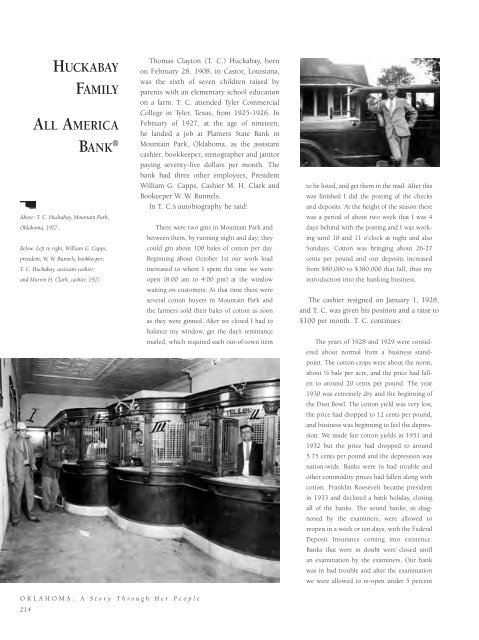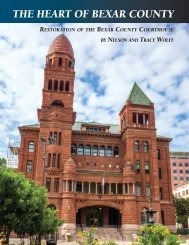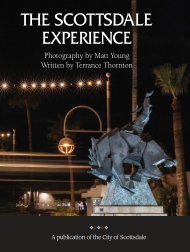Oklahoma: A Story Through Her People
A full-color photography book showcasing Oklahoma paired with the histories of companies, institutions, and organizations that have made the state great.
A full-color photography book showcasing Oklahoma paired with the histories of companies, institutions, and organizations that have made the state great.
Create successful ePaper yourself
Turn your PDF publications into a flip-book with our unique Google optimized e-Paper software.
HUCKABAY<br />
FAMILY<br />
ALL AMERICA<br />
BANK ®<br />
Above: T. C. Huckabay, Mountain Park,<br />
<strong>Oklahoma</strong>, 1927.<br />
Below: Left to right, William G. Capps,<br />
president; W. W. Runnels, bookkeeper;<br />
T. C. Huckabay, assistant cashier;<br />
and Marvin H. Clark, cashier, 1927.<br />
Thomas Clayton (T. C.) Huckabay, born<br />
on February 28, 1908, in Castor, Louisiana,<br />
was the sixth of seven children raised by<br />
parents with an elementary school education<br />
on a farm. T. C. attended Tyler Commercial<br />
College in Tyler, Texas, from 1925-1926. In<br />
February of 1927, at the age of nineteen,<br />
he landed a job at Planters State Bank in<br />
Mountain Park, <strong>Oklahoma</strong>, as the assistant<br />
cashier, bookkeeper, stenographer and janitor<br />
paying seventy-five dollars per month. The<br />
bank had three other employees, President<br />
William G. Capps, Cashier M. H. Clark and<br />
Bookeeper W. W. Runnels.<br />
In T. C.’s autobiography he said:<br />
There were two gins in Mountain Park and<br />
between them, by running night and day; they<br />
could gin about 100 bales of cotton per day.<br />
Beginning about October 1st our work load<br />
increased to where I spent the time we were<br />
open (8:00 am to 4:00 pm) at the window<br />
waiting on customers. At that time there were<br />
several cotton buyers in Mountain Park and<br />
the farmers sold their bales of cotton as soon<br />
as they were ginned. After we closed I had to<br />
balance my window, get the day’s remittance<br />
mailed, which required each out-of-town item<br />
to be listed, and get them in the mail. After this<br />
was finished I did the posting of the checks<br />
and deposits. At the height of the season there<br />
was a period of about two week that I was 4<br />
days behind with the posting and I was working<br />
until 10 and 11 o’clock at night and also<br />
Sundays. Cotton was bringing about 26-27<br />
cents per pound and our deposits increased<br />
from $80,000 to $380,000 that fall, thus my<br />
introduction into the banking business.<br />
The cashier resigned on January 1, 1928,<br />
and T. C. was given his position and a raise to<br />
$100 per month. T. C. continues:<br />
The years of 1928 and 1929 were considered<br />
about normal from a business standpoint.<br />
The cotton crops were about the norm,<br />
about ½ bale per acre, and the price had fallen<br />
to around 20 cents per pound. The year<br />
1930 was extremely dry and the beginning of<br />
the Dust Bowl. The cotton yield was very low,<br />
the price had dropped to 12 cents per pound,<br />
and business was beginning to feel the depression.<br />
We made fair cotton yields in 1931 and<br />
1932 but the price had dropped to around<br />
5.75 cents per pound and the depression was<br />
nation-wide. Banks were in bad trouble and<br />
other commodity prices had fallen along with<br />
cotton. Franklin Roosevelt became president<br />
in 1933 and declared a bank holiday, closing<br />
all of the banks. The sound banks, as diagnosed<br />
by the examiners, were allowed to<br />
reopen in a week or ten days, with the Federal<br />
Deposit Insurance coming into existence.<br />
Banks that were in doubt were closed until<br />
an examination by the examiners. Our bank<br />
was in bad trouble and after the examination<br />
we were allowed to re-open under 5 percent<br />
O K L A H O M A : A S t o r y T h r o u g h H e r P e o p l e<br />
214
















